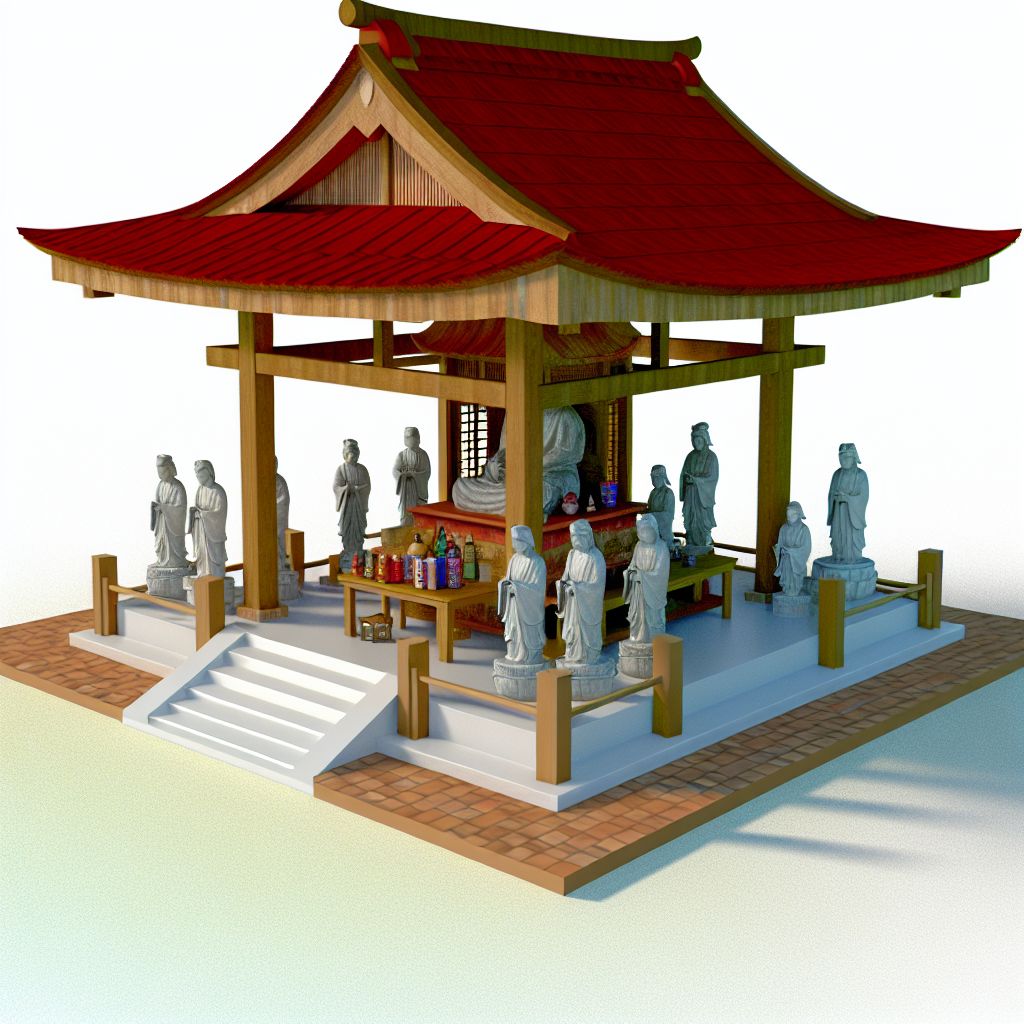Deutsch: Schrein / Español: Santuario / Português: Santuário / Français: Sanctuaire / Italiano: Santuario
In the travel context, shrine refers to a holy or sacred place, often dedicated to a specific deity, saint, or divinity, where people come to worship, offer prayers, or pay homage. Shrines are found across various cultures and religions worldwide, and they can range from simple structures or natural settings to elaborate buildings. For travelers, visiting shrines offers a unique insight into the spiritual practices, cultural traditions, and architectural styles of the local community.
Description

Shrines play a significant role in the cultural and religious landscape of many destinations, attracting not only pilgrims and worshippers but also tourists interested in history, art, and spirituality. These sacred sites often hold historical significance and are situated in locations believed to be endowed with spiritual power or historical importance, such as the site of a miracle, the burial place of a saint, or an area of natural beauty.
Visiting a shrine can be a deeply moving and educational experience, offering a moment of reflection and peace. It also provides an opportunity to observe religious ceremonies and practices firsthand, understand the symbolism and significance of the shrine, and appreciate the craftsmanship of its icons, relics, and architecture.
Application Areas
- Cultural Tourism: Exploring shrines to understand the cultural and religious traditions of a destination.
- Spiritual Journeys: Undertaking pilgrimages to shrines for personal reflection, healing, or fulfilling religious obligations.
- Architectural Interest: Appreciating the architectural beauty and craftsmanship of shrines, which often incorporate elements significant to their religious and cultural context.
- Historical Exploration: Learning about the history and stories associated with shrines and their role in the local community and history.
Well-Known Examples
- Fushimi Inari Shrine, Japan: Famous for its thousands of vermilion torii gates, dedicated to the Shinto god of rice and agriculture.
- The Shrine of Our Lady of Guadalupe, Mexico: One of the most visited Catholic pilgrimage sites in the world, dedicated to the Virgin Mary.
- The Western Wall, Israel: The last remaining wall of the Second Jewish Temple in Jerusalem, considered sacred by Jews.
- Mecca, Saudi Arabia: Home to the Kaaba, the most sacred shrine in Islam, where Muslims aim to make a pilgrimage at least once in their lifetime.
Treatment and Risks
When visiting shrines, it's essential to approach with respect and sensitivity towards the religious practices and customs observed there. Dress codes and behavioral norms should be adhered to, and photography may be restricted in certain areas. Visitors should also be mindful of the impact their presence has on the site, ensuring they do not disturb worshippers or degrade the sanctity of the shrine.
Similar Terms or Synonyms
- Temple
- Church
- Mosque
- Pagoda
Articles with 'Shrine' in the title
- Sheikh Safi al-din Khanegah and Shrine Ensemble in Ardabil: The Sheikh Safi al-din Khanegah and Shrine Ensemble in Ardabil is a World Heritage site in Iran (Islamic Republic of) defined by the UNESCO in 2010 and definitely a recommended cultural sightseeing location
Summary
Shrines are significant cultural and religious landmarks that offer travelers a window into the spiritual heart of a community. They are places of worship, reflection, and historical importance, reflecting the architectural, cultural, and religious diversity of their locations. Visiting shrines can enrich travel experiences, providing insights into the beliefs and traditions that shape local identities and histories. It is important for travelers to visit these sacred sites with the utmost respect and openness to learning.
--
Related Articles to the term 'Shrine' | |
| 'Culture' at fashion-glossary.com | ■■■■■■■■■■ |
| Culture: In the fashion context, culture refers to the influences, traditions, and values of a particular . . . Read More | |
| 'Community' | ■■■■■ |
| A Community is when people living in one place, district, state, or Country (NEAP, 2000). With other . . . Read More | |
| 'Deity' at psychology-lexicon.com | ■■■■ |
| Deity in the psychology context refers to a god or goddess in a polytheistic religion, or any divine . . . Read More | |
| 'Relic' | ■■■■ |
| Relic in the context of travel refers to an object of historical, cultural, or religious significance . . . Read More | |
| 'Gastronomy' | ■■■■ |
| Gastronomy in the context of travel refers to the exploration and enjoyment of a destination’s Food, . . . Read More | |
| 'Library' | ■■■■ |
| Library in the travel context refers to public or private institutions, as well as smaller book collections . . . Read More | |
| 'History' at glorious-food-glossary.com | ■■■■ |
| History in the food context refers to the study and exploration of how food and culinary practices have . . . Read More | |
| 'Tsingtao' | ■■■ |
| Tsingtao (also spelled Qingdao) is a coastal city in Shandong Province, China, known for its beautiful . . . Read More | |
| 'München' | ■■■ |
| München is the capital city of Bavaria, Germany, known for its rich history, cultural heritage, and . . . Read More | |
| 'Lemberg' | ■■■ |
| Lemberg, known today as Lviv, is a historic city in western Ukraine that is renowned for its rich cultural . . . Read More | |
